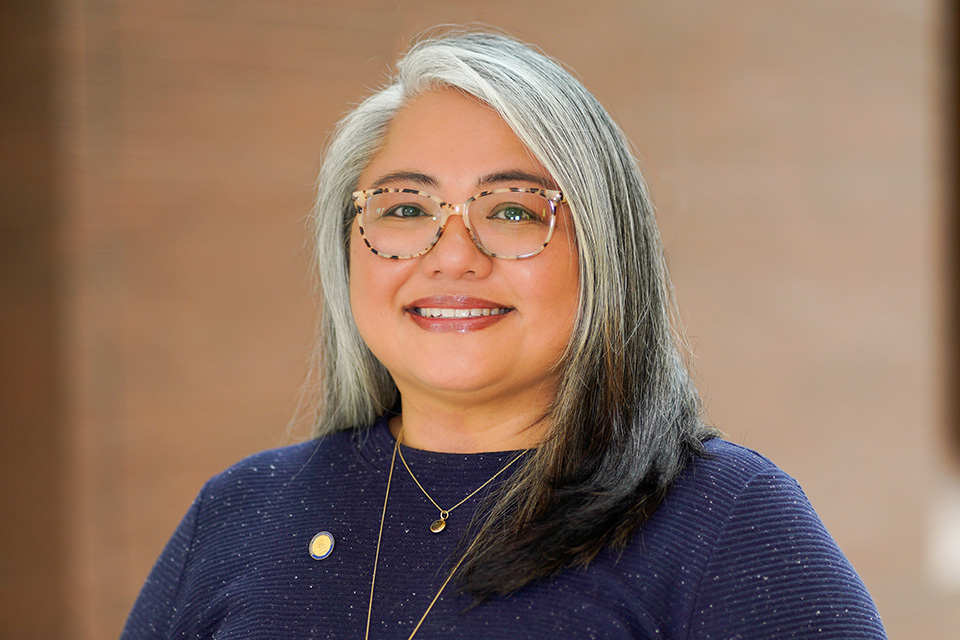My UMSOP Story: Cherokee Layson-Wolf, PharmD ’00, BCACP, FAPhA, professor
Cherokee Layson-Wolf, PharmD ’00, BCACP, FAPhA, graduated from the Doctor of Pharmacy (PharmD) program at the University of Maryland School of Pharmacy and is now on faculty as a professor in the Department of Practice, Sciences, and Health Outcomes Research.
What is your background and what was your path to pharmacy school?
I immigrated from the Philippines when I was 4 years old. I’ve lived in Maryland most of my life. My family is full of nurses, my mom included, so we were always encouraged to pursue careers in health care. It was my mom, the ICU nurse of over 40 years, who encouraged me to look into pharmacy.
What interested you in UMSOP, and what was your experience like here?
The University of Maryland School of Pharmacy was a top-rated school in my backyard. I was able to learn from leaders in their field but what really inspired me to come to this school was the engagement with current students: their poise, composure, and friendly nature really drew me to the School when I visited and I was grateful to have been accepted.
Attending the University of Maryland School of Pharmacy helped me know that I wasn’t just getting an education for myself, but I was learning that I had a role to play in shaping and maintaining the profession. As a student it sometime seems unbelievable a single person can have that impact, but the faculty and staff here helped give me the tools to succeed, the confidence to lead, and the support to do what was needed to seek out my interests and also serve the profession.
What was your career path after pharmacy school?
After pharmacy school, I completed a community residency with Virginia Commonwealth University. After completing my residency, I joined the University of Maryland School of Pharmacy as an assistant professor and shared faculty member with NeighborCare Professional Pharmacies. I worked with them for almost 10 years as their patient care program coordinator, and then I served as practice lab director, assistant dean for experiential learning, and associate dean for student affairs. Through all those roles I’ve gotten to learn more about the School and the University of Maryland, Baltimore campus.
How has your experience as a faculty member at UMSOP differed from your experience as a student?
As a student you really don’t always understand that the faculty do so much more than just standing in front of the classroom. It’s important to share and expose to our students the work we do so they can see themselves in those roles as well.
I knew that there was a triad of work: teaching, scholarship, and service, but I don’t think I ever knew how busy I would actually be. While there is a great deal of work, you still learn a lot. You sometimes get the opportunity to go out of your comfort zone and continue to build connections and friends, which are so valuable in this profession.
Nothing is more rewarding than seeing our students’ successes and that’s what we want for our students: to get the opportunity to do more than we ever have. Students are certainly an inspiration. Their energy, prior experiences, and perspectives that they bring to their work here continue to inspire me to work with them broadly and on an individual level.
What draws you to being a professor and the different roles you’ve had?
I have to thank my department chairs and deans for always supporting my work and experiences. We are given the time and space to pursue our interests and also support the profession in various ways, such as service, educating, and mentoring the future of pharmacy and our students. We always hear that pharmacy is a small world and it really is. I’m fortunate that I still work with so many pharmacists that I met as a student and early in my career and continue to meet people with every new opportunity and project. It’s so important to me that students know that pharmacy school is beyond what they learn in the classroom, that they take on opportunities that push them out of their comfort zone and that their classmates are colleagues they will have the rest of their lives, so supporting each other is extremely important.
Why is community pharmacy crucial to society and public health?
Community pharmacy is such a valuable resource to our communities, as pharmacists are the most accessible health care provider. We have worked hard to gain the ability to grow available services for our community pharmacies, but we have additional work to do. One, to spread the word of what is available, and two, support our community colleagues to be able to provide those services. Our community pharmacists are the face of the profession and deserve our ongoing support and attention to help them serve patients in the best way possible.
About the PharmD program: Based in downtown Baltimore, the PharmD at the University of Maryland School of Pharmacy combines basic and applied science as well as an in-depth therapeutics course of study to provide future generations of pharmacists with the knowledge and skills needed to be essential contributors in the dynamic health care arena. Learn more and apply today.

